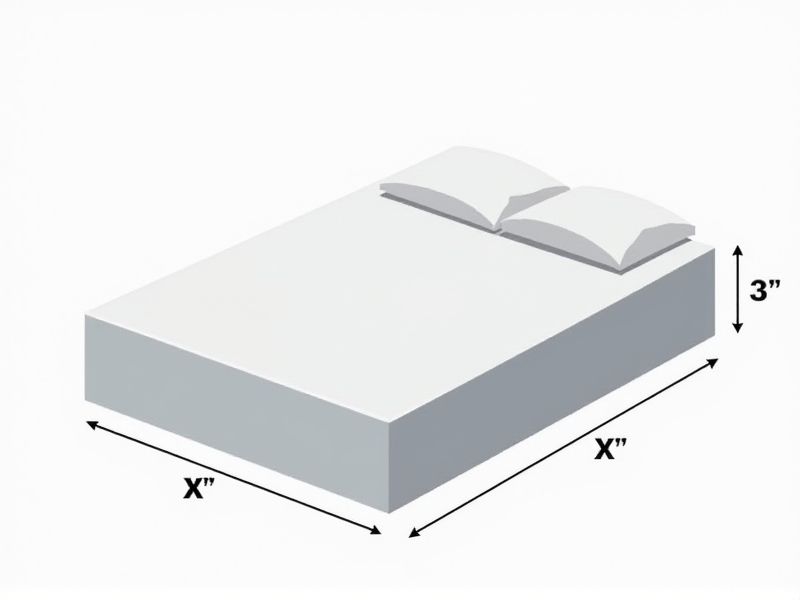
When choosing a mattress, understanding standard sizes can help you pick the right fit for your bedroom and sleeping needs. Common mattress dimensions include Twin (38" x 75"), Full (54" x 75"), Queen (60" x 80"), and King (76" x 80"). For example, a Queen-size mattress is a popular choice for couples due to its generous width and length without taking up too much space in most bedrooms. Selecting the right size ensures comfort, optimizes your room layout, and accommodates anyone who will be using the bed.
Twin
A standard twin mattress measures 38 x 75 inches, making it an ideal choice for small bedrooms or children's rooms. With a thickness ranging typically between 8 to 12 inches, these mattresses provide ample support and comfort for a single sleeper. Weighing around 40 to 60 pounds, twin mattresses are manageable for easy setup and transportation. When selecting a twin mattress, consider factors such as material type, firmness level, and budget, which typically averages between $200 and $800 depending on quality and brand.
Twin Xl
The Twin XL mattress measures 38 inches wide by 80 inches long, making it an ideal choice for taller individuals seeking space-efficient sleeping solutions. With a height typically ranging from 8 to 14 inches, these mattresses are often designed for enhanced support and comfort. Popular materials include memory foam, latex, and innerspring, each offering distinct benefits for sleep quality and spinal alignment. When choosing a Twin XL mattress, consider factors such as firmness level and your personal sleep preferences to ensure optimal rest.
Full/Double
The Full or Double mattress typically measures 54 inches in width and 75 inches in length, offering ample sleeping space for individuals or couples. With a sleeping surface that accommodates various body types, this size combines comfort and versatility in smaller bedrooms. The average weight capacity of a Full mattress ranges from 400 to 600 pounds, depending on the materials used in its construction. You can find an array of options, including innerspring, memory foam, and hybrid mattresses, each designed for optimal support and pressure relief.
Queen
The standard dimensions for a Queen mattress measure 60 inches wide by 80 inches long, providing ample space for couples or individuals who prefer extra room. With a surface area of 4,800 square inches, the Queen size is one of the most popular mattress choices among consumers, ideally balancing comfort and space. Recommended for bedrooms measuring at least 10 by 10 feet, this mattress size supports better sleep quality and promotes a restful environment. When selecting a Queen mattress, consider factors such as firmness, material composition, and durability to enhance your sleep experience.
King
A standard King mattress measures 76 inches in width and 80 inches in length, providing ample space for couples or individuals who prefer extra room while sleeping. This size offers 16 square feet more than a Queen mattress, making it an ideal choice for those who value comfort and space. With various materials available, such as memory foam, innerspring, and latex, a King mattress can cater to diverse sleeping preferences and requirements. When investing in a King mattress, consider features like firmness level and durability, which can significantly impact your overall sleep quality.
California King
The California King mattress measures 72 inches wide by 84 inches long, providing ample space for taller individuals who require extra legroom. This size is particularly favored in homes where luxury and comfort are priorities, accommodating couples who desire more personal space during sleep. When shopping for a California King mattress, consider materials such as memory foam, innerspring, or latex for optimal support and durability. A high-quality mattress in this size can range from $1,000 to $3,000, depending on brand and features, making it an investment in your sleep quality.
Thickness
The standard thickness of a mattress significantly influences your sleep quality and comfort, typically ranging from 8 to 14 inches. A thicker mattress, generally over 12 inches, often offers enhanced support and pressure relief, making it ideal for side sleepers who require additional cushioning for their hips and shoulders. Conversely, a mattress below 10 inches may be suitable for stomach sleepers or those looking for firmer support, especially on adjustable bed bases. When selecting your mattress, consider not just thickness but also the materials used, as this can further impact durability and performance.
Depth
The standard depth of a mattress typically ranges from 8 to 16 inches, with most consumers preferring a depth between 10 and 12 inches for optimal comfort. Depth influences not only the feel but also the support level; thicker mattresses often contain multiple layers of materials, enhancing pressure relief and body contouring. For back pain sufferers, a mattress with a depth of at least 12 inches is often recommended to ensure adequate spinal alignment and support. When choosing your mattress, be sure to consider how depth impacts not just comfort but also your overall sleep quality.
Custom Sizes
Custom-sized mattresses allow you to optimize your sleep environment according to your unique space and needs. With dimensions crafted to fit specific bed frames or to accommodate personal preferences, options can range from 72 inches by 36 inches for a twin to oversized selections such as 84 inches by 72 inches for luxurious king beds. Many manufacturers offer a variety of materials including memory foam, latex, and innerspring, catering to specific firmness levels and comfort styles. Investing in a custom-sized mattress can enhance your sleep quality, supporting healthier sleep patterns tailored specifically to you.
Bunk Mattress Sizes
Bunk mattress sizes typically range from 38 inches by 74 inches for twin configurations to 54 inches by 75 inches for full bunk mattresses. Most bunk beds are designed to accommodate these standard mattress dimensions, ensuring a secure and snug fit within the bunk frame. It's essential to consider mattress thickness; a height of 6 to 8 inches is often recommended to prevent safety hazards. When selecting a bunk mattress, you should also prioritize materials that ensure durability while providing adequate support for restful sleep.
